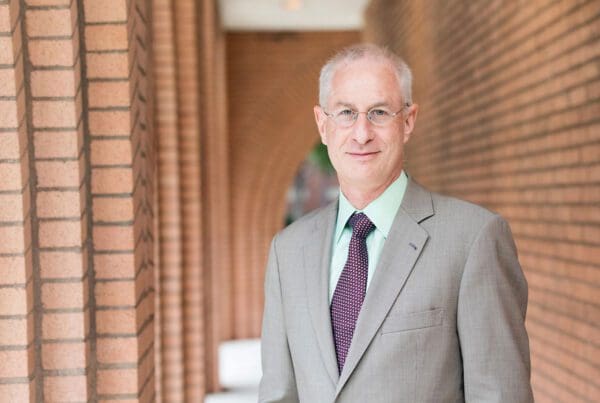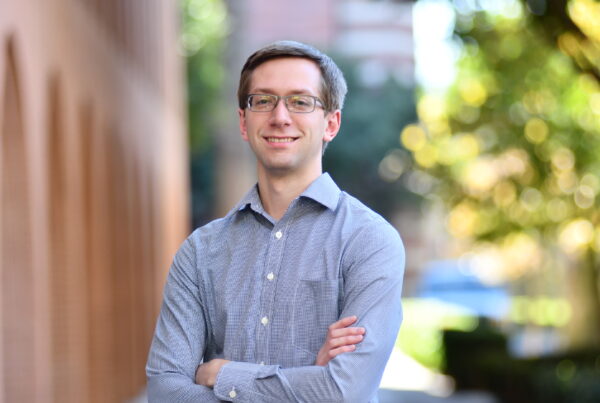Local community members learned more about taking care of both loved ones and themselves during the 15th annual Caregivers Are Learning More (CALM) Conference and Resource Fair held at the USC Leonard Davis School of Gerontology on November 1.
Organized by the USC Family Caregiver Support Center (FCSC), the conference featured valuable information on the basics of safely caring for an elderly or disabled family member as well as in-depth discussions of legal options and self-care for caregivers. In her opening remarks, FCSC Director Donna Benton noted that the conference marked the start of National Family Caregivers Month and that the day’s discussions were all aimed at helping participants to “be ‘calm’ when care comes home.”
“Helping a family member doesn’t always come with an instruction manual,” Benton said. “We know you’re already strong; we want to help strengthen what you’re doing.”
Adriana Mendoza, associate state director for AARP California, described the average California caregiver—a 49-year-old woman who works outside of the home and who will care for a parent for more than five years—and discussed the wider societal impact of caregiving. Currently, the estimated economic value of unpaid family caregiving in California is $47 billion each year, which is more than the total yearly value of Medi-Cal, she said.
“Caring for an aging relative of friend is the new normal,” Mendoza said. “Family caregivers are essential for our healthcare system.”
Sheryl Flynn, president and CEO of Blue Marble Game Company, discussed the potential for virtual reality and video games to help aging patients exercise their bodies and minds while providing assessments of their abilities for their caregivers and doctors. Throughout the day, attendees had the opportunity to try several Blue Marble games, including one that guided players through exercises designed for fall prevention and another that used puzzles to measure cognitive ability.
“Healthcare is changing; there is more responsibility on the patients and caregivers,” Flynn said. “A lot of that is going to require technology.”
Keynote speaker Ernesto Quintero, a filmmaker who grew up in Lincoln Heights, shared the story of his brother Juan, who was diagnosed with amyotrophic lateral sclerosis (ALS), or Lou Gehrig’s disease, in 2005. Quintero’s documentary film, “A Sacred Journey,” follows Juan and the rest of his family as he is diagnosed, faces health challenges with the support of his whole family, and vows to give something back to the community: an inspirational mural for the local elementary school.
Quintero said the film, which is still in progress, will serve not only as a celebration of his brother and healing tool for him and his family but also as a way to spread awareness of ALS and caregiving.
“It’s not easy to be a caregiver and deal with the day-to-day grind,” Quintero said. “There are 66 million caregivers in the U.S., and we need to be there for them.”
Other conference presenters also acknowledged the taxing challenges—mental, physical, and legal—of caregiving.
Skye Kelly, founder and executive director of the nonprofit organization Heal One World as well as a certified massage and holistic health practitioner, shared tips for self-care and stress relief. After leading attendees through stretching and Tai Chi exercises, she emphasized the importance of working self-care techniques and free time into a caregiving schedule as well as readying a “self-care emergency kit” of people and resources to help with tough times.
“Self-care is active participation in enhancing the quality of your health,” Kelly said. “We often forget that we’re only there for others as much as we’re there for ourselves.”
Caregiving for loved ones with mobility issues, especially adults who are taller or heavier than the caregiver, can pose serious physical challenges, said Nathan Drati, a nurse with in-home care company My CARE Professionals. Using audience volunteers, he demonstrated ways to safely help loved ones with walking, sitting, and getting in and out of bed.
Back injury, including overexertion and cumulative stress, is the most common and costly risk faced by caregivers, and “good body mechanics avoids undue strain on your back,” Drati said.
Carlos Arcos, an elder care planning attorney based in Arcadia, discussed common sources of disagreements and options for families caring for an aging loved one. He described the important choices often faced by caregivers, stressing the need for open conversations that respect older adults’ desire for independence as well as frank discussions regarding power of attorney responsibilities and how to efficiently transfer assets to loved ones.
“No matter how much you have, you want it to go to the intended person quickly and efficiently,” Arcos said.
Attendee Patricia Lofland of Long Beach praised the conference, saying that the information about financial issues was especially helpful to her. As the primary caregiver for Trusten Lofland, her husband of 40 years and a sufferer of Alzheimer’s disease, having to make important financial decisions without his input has been the biggest change, she said.
“In matters of business and money, we were very good together,” she recalled. But while her husband still enjoys relatively good physical health, Lofland said it is now up to her to make the many financial and caregiving choices they face as a couple, and new, urgent decisions arise frequently.




